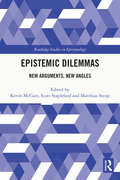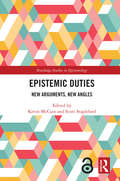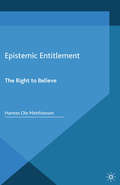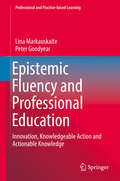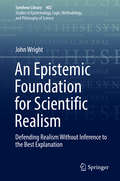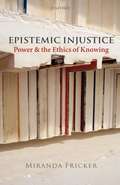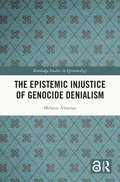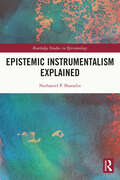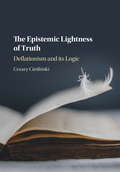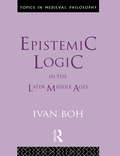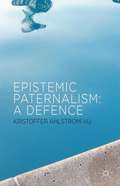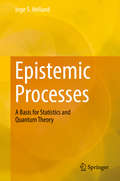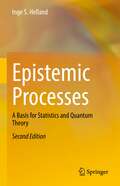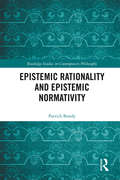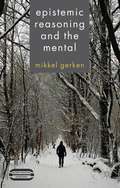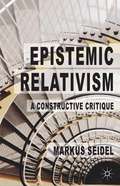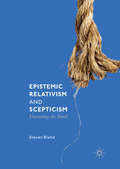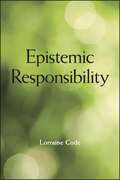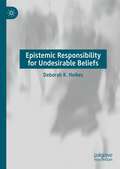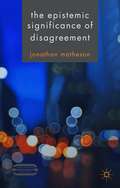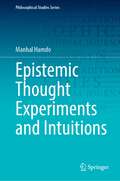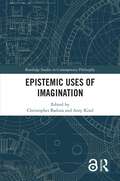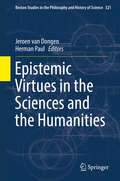- Table View
- List View
Epistemic Dilemmas: New Arguments, New Angles (Routledge Studies in Epistemology)
by McCain Kevin Stapleford Scott Steup MatthiasThis book features original essays by leading epistemologists that address questions related to epistemic dilemmas from a variety of new, sometimes unexpected, angles. It seems plausible that there can be "no win" moral situations in which no matter what one does one fails some moral obligation. Is there an epistemic analog to moral dilemmas? Are there epistemically dilemmic situations—situations in which we are doomed to violate an epistemic requirement? If there are, when exactly do they arise and what can we learn from them? The contributors to this volume cover a wide variety of positions on epistemic dilemmas. The coverage ranges from discussions of the nature of epistemic dilemmas to arguments that there are no such things to suggestions for how to resolve (or at least live with) epistemic dilemmas to proposals for how thinking about epistemic dilemmas can be used to inform theorizing in other areas of epistemology. Epistemic Dilemmas will be of interest to scholars and advanced students in epistemology working on the nature of justification and evidential support, higher-order requirements, or suspension of judgment.
The Epistemic Dimensions of Ignorance
by Rik Peels Martijn BlaauwIgnorance is a neglected issue in philosophy. This is surprising for, contrary to what one might expect, it is not clear what ignorance is. Some philosophers say or assume that it is a lack of knowledge, whereas others claim or presuppose that it is an absence of true belief. What is one ignorant of when one is ignorant? What kinds of ignorance are there? This neglect is also remarkable because ignorance plays a crucial role in all sorts of controversial societal issues. Ignorance is often thought to be a moral and legal excuse; it is a core concept in medical ethics and debates about privacy, and it features in religious traditions and debates about belief in God. This book does not only study an epistemic phenomenon that is interesting in itself, but also provides important tools that can be fruitfully used in debates within and beyond philosophy.
Epistemic Duties: New Arguments, New Angles (Routledge Studies in Epistemology)
by Kevin McCainThere are arguably moral, legal, and prudential constraints on behavior. But are there epistemic constraints on belief? Are there any requirements arising from intellectual considerations alone? This volume includes original essays written by top epistemologists that address this and closely related questions from a variety of new, sometimes unexpected, angles. It features a wide variety of positions, ranging from arguments for and against the existence of purely epistemic requirements, reductions of epistemic requirements to moral or prudential requirements, the biological foundations of epistemic requirements, extensions of the scope of epistemic requirements to include such things as open-mindedness, eradication of implicit bias and interpersonal duties to object, to new applications such as epistemic requirements pertaining to storytelling, testimony, and fundamentalist beliefs. Anyone interested in the nature of responsibility, belief, or epistemic normativity will find a range of useful arguments and fresh ideas in this cutting-edge anthology.
Epistemic Entitlement
by Hannes Ole MatthiessenWhat entitles you to claims about your perceivable environment? Matthiessen suggests that it is neither your experience, nor the reliability of your cognitive processes, but rather your being in the right kind of perceptual situation.
Epistemic Fluency and Professional Education
by Lina Markauskaite Peter GoodyearThisbook, by combing sociocultural, material, cognitive and embodied perspectives ofhuman knowing, offers a new and powerful conceptualisation of professional epistemicfluency - a capacity that underpins professional knowledgeable action andinnovation. Using results from empirical studies it sheds light on practicalways in which the development of epistemic fluency can be recognised andsupported - in higher education and in the transition to work. Peoplewho are flexible in respect to different ways of knowing can be said to possessepistemic fluency -they are adept to combine different kinds of specialised and context-dependentknowledge and enact their knowing in solving problems encountered in the world. Whatdoes it take to be a productive member of a multidisciplinary team working on acomplex problem? What enables a person to integrate different types and fieldsof knowledge, indeed different ways of knowing, in order to make somewell-founded decisions and take actions in the world? What personal knowledgeresources are entailed in analysing a problem and describing an innovativesolution, such that the innovation can be shared in an organization orprofessional community? How do people get better at these things; and how canteachers in higher education help students develop these valued capacities? Theanswers to these questions are central to a thorough understanding of what itmeans to become an effective knowledge worker and resourceful professional.
An Epistemic Foundation for Scientific Realism: Defending Realism Without Inference To The Best Explanation (Synthese Library #402)
by John WrightThis monograph develops a new way of justifying the claims made by science about phenomenon not directly observable by humans, such as atoms and black holes. It details a way of making inferences to the existence and properties of unobservable entities and states of affairs that can be given a probabilistic justification. The inferences used to establish realist claims are not a form of, and neither do they rely on, inference to the best explanation. Scientific Realism maintains that scientific theories and hypotheses refer to real entities, forces, and relations, even if one cannot examine them. But, there are those who doubt these claims. The author develops a novel way of defending Scientific Realism against a range of influential attacks. He argues that in some cases, at least, we can make probabilistically justifiable inferences from observed data to claims about unobservable, theoretical entities. He shows how this enables us to place some scientific realist claims on a firmer epistemological footing than has previously been the case. This also makes it possible to give a unified set of replies to the most common objections to Scientific Realism. The final chapters apply the developed conceptual apparatus to key cases from the history of science and from recent science. One example concerns realism with respect to atoms. Another looks at inferences from recent astronomical data to conclusions about the size and shape of those parts of the universe lying beyond that which we can observe.
Epistemic Injustice: Power and the Ethics of Knowing
by Miranda FrickerEpistemic Injustice explores a form of injustice which has so far been largely ignored in English-language philosophy: epistemic injustice - that is to say, a wrong suffered in one's capacity as a knower. Miranda Fricker distinguishes two forms of epistemic injustice: testimonial injustice and hermeneutical injustice. In connection with both, she argues that our testimonial sensibility needs to incorporate a corrective, anti-prejudicial virtue that canbe used to promote a more veridical and a more democratic epistemic practice.
The Epistemic Injustice of Genocide Denialism (Routledge Studies in Epistemology)
by Melanie AltanianThe injustice of genocide denial is commonly understood as a violation of the dignity of victims, survivors, and their descendants, and further described as an assault on truth and memory. This book rethinks the normative relationship between dignity, truth, and memory in relation to genocide denial by adopting the framework of epistemic injustice.This framework performs two functions. First, it introduces constructive normative vocabulary into genocide scholarship through which we can gain a better understanding of the normative impacts of genocide denial when it is institutionalized and systematic. Second, it develops and enriches current scholarship on epistemic injustice with a further, underexplored case study. Genocide denialism is relevant for political and social epistemology, as it presents a substantive epistemic practice that distorts normativity and social reality in ways that maintain domination. This generates pervasive ignorance that makes denial rather than recognition of genocide appear as the morally and epistemically right thing to do. By focusing on the prominent case of Turkey’s denialism of the Armenian genocide, the book shows the serious consequences of this kind of epistemic injustice for the victim group and society as a whole.The Epistemic Injustice of Genocide Denialism will appeal to students and scholars working in social, political, and applied epistemology, social and political philosophy, genocide studies, Armenian studies, and memory studies.The Open Access version of this book, available at www.taylorfrancis.com, has been made available under a Creative Commons Attribution-Non Commercial-No Derivatives (CC-BY-NC-ND) 4.0 license. Any third party material in this book is not included in the OA Creative Commons license, unless indicated otherwise in a credit line to the material. Please direct any permissions enquiries to the original rightsholder.Funded by: Swiss National Science Foundation
Epistemic Instrumentalism Explained (Routledge Studies in Epistemology)
by Nathaniel SharadinDo epistemic requirements vary along with facts about what promotes agents' well-being? Epistemic instrumentalists say 'yes', and thereby earn a lot of contempt. This contempt is a mistake on two counts. First, it is incorrectly based: the reasons typically given for it are misguided. Second, it fails to distinguish between first- and second-order epistemic instrumentalism; and, it happens, only the former is contemptible.In this book, Nathaniel P. Sharadin argues for rejecting epistemic instrumentalism as a first-order view not because it suffers extensional failures, but because it suffers explanatory ones. By contrast, he argues that epistemic instrumentalism offers a natural, straightforward explanation of why being epistemically correct matters. What emerges is a second-order instrumentalist explanation for epistemic authority that is neutral between competing first-order epistemic theories. This neutrality is an advantage. But, drawing on work from cognitive science and psychology, Sharadin argues that instrumentalists can abandon that neutrality in order to adopt a view he calls epistemic ecologism.Epistemic Instrumentalism Explained will be of interest to researchers and advanced students working in epistemology, ethics, and philosophy of mind.
Epistemic Instrumentalism Explained (Routledge Studies in Epistemology)
by Nathaniel P. SharadinDo epistemic requirements vary along with facts about what promotes agents' well-being? Epistemic instrumentalists say 'yes', and thereby earn a lot of contempt. This contempt is a mistake on two counts. First, it is incorrectly based: the reasons typically given for it are misguided. Second, it fails to distinguish between first- and second-order epistemic instrumentalism; and, it happens, only the former is contemptible. In this book, Nathaniel P. Sharadin argues for rejecting epistemic instrumentalism as a first-order view not because it suffers extensional failures, but because it suffers explanatory ones. By contrast, he argues that epistemic instrumentalism offers a natural, straightforward explanation of why being epistemically correct matters. What emerges is a second-order instrumentalist explanation for epistemic authority that is neutral between competing first-order epistemic theories. This neutrality is an advantage. But, drawing on work from cognitive science and psychology, Sharadin argues that instrumentalists can abandon that neutrality in order to adopt a view he calls epistemic ecologism. Epistemic Instrumentalism Explained will be of interest to researchers and advanced students working in epistemology, ethics, and philosophy of mind.
The Epistemic Lightness of Truth: Deflationism And Its Logic
by Cezary CieślińskiThis book analyses and defends the deflationist claim that there is nothing deep about our notion of truth. According to this view, truth is a 'light' and innocent concept, devoid of any essence which could be revealed by scientific inquiry. Cezary Cieśliński considers this claim in light of recent formal results on axiomatic truth theories, which are crucial for understanding and evaluating the philosophical thesis of the innocence of truth. Providing an up-to-date discussion and original perspectives on this central and controversial issue, his book will be important for those with a background in logic who are interested in formal truth theories and in current philosophical debates about the deflationary conception of truth.
Epistemic Logic in the Later Middle Ages (Topics in Medieval Philosophy)
by Ivan BohEpistemic Logic studies statements containing verbs such as 'know' and 'wish'. It is one of the most exciting areas in medieval philosophy. Neglected almost entirely after the end of the Middle Ages, it has been rediscovered by philosophers of the present century. This is the first comprehensive study of the subject. Ivan Boh explores the rules for entailment between epistemic statements, the search for the conditions of knowing contingent propositions, the problems of substitutivity in intentional contexts, the relationship between epistemic and modal logic, and the problems of composite and divided senses in authors ranging from Abelard to Frachantian.
Epistemic Paternalism
by Kristoffer Ahlstrom-VijAny attempt to help us reason in more accurate ways faces a problem: While we acknowledge that others stand to benefit from intellectual advice, each and every one of us tends to consider ourselves an exception, on account of overconfidence. The solution? Accept a form of epistemic paternalism.
Epistemic Processes: A Basis for Statistics and Quantum Theory
by Inge S. HellandThis book discusses a link between statistical theory and quantum theory based on the concept of epistemic processes – which can be e.g. statistical investigations or quantum mechanical measurements, and refer to processes that are used to gain knowledge about something. The book addresses a range of topics, including a derivation of the Born formula from reasonable assumptions, a derivation of the Schrödinger equation in the one-dimensional case, and a discussion of the Bell inequality from an epistemic perspective. The book describes a possible epistemic foundation of quantum theory. Lastly, it presents a general philosophical discussion of the approach, which, principally speaking, is not restricted to the micro-world. Hence the book can also be seen as a motivation for further research into quantum decision theory and quantum models for cognition. The book will benefit a broad readership, including physicists and statisticians interested in the foundation of their disciplines, philosophers of science and graduate students, and anyone with a reasonably good background in mathematics and an open mind.
Epistemic Processes: A Basis for Statistics and Quantum Theory
by Inge S. HellandThis book discusses a link between statistical theory and quantum theory based on the concept of epistemic processes. The latter are processes, such as statistical investigations or quantum mechanical measurements, that can be used to obtain knowledge about something. Various topics in quantum theory are addressed, including the construction of a Hilbert space from reasonable assumptions and an interpretation of quantum states. Separate derivations of the Born formula and the one-dimensional Schrödinger equation are given. In concrete terms, a Hilbert space can be constructed under some technical assumptions associated with situations where there are two conceptual variables that can be seen as maximally accessible. Then to every accessible conceptual variable there corresponds an operator on this Hilbert space, and if the variables take a finite number of values, the eigenspaces/eigenvectors of these operators correspond to specific questions in nature together with sharp answers to these questions. This paves a new way to the foundations of quantum theory. The resulting interpretation of quantum mechanics is related to Hervé Zwirn's recent Convivial Solipsism, but it also has some relations to Quantum Bayesianism and to Rovelli's relational quantum mechanics. Niels Bohr's concept of complementarity plays an important role. Philosophical implications of this approach to quantum theory are discussed, including consequences for macroscopic settings.The book will benefit a broad readership, including physicists and statisticians interested in the foundations of their disciplines, philosophers of science and graduate students, and anyone with a reasonably good background in mathematics and an open mind.
Epistemic Rationality and Epistemic Normativity (Routledge Studies in Contemporary Philosophy)
by Patrick BondyThe aim of this book is to answer two important questions about the issue of normativity in epistemology: Why are epistemic reasons evidential and what makes epistemic reasons and rationality normative? Bondy's argument proceeds on the assumption that epistemic rationality goes hand in hand with basing beliefs on good evidence. The opening chapters defend a mental-state ontology of reasons, a deflationary account of how kinds of reasons are distinguished, and a deliberative guidance constraint on normative reasons. They also argue in favor of doxastic voluntarism—the view that beliefs are subject to our direct voluntary control—and embrace the controversial view that voluntarism bears directly on the question of what kinds of things count as reasons for believing. The final three chapters of the book feature a noteworthy critique of the instrumental conception of the nature of epistemic rationality, as well as a defense of the instrumental normativity of epistemic rationality. The final chapter defends the view that epistemic reasons and rationality are normative for us when we have normative reason to get to the truth with respect to some proposition, and it provides a response to the swamping problem for monistic accounts of value.
Epistemic Reasoning And The Mental
by Mikkel GerkenEpistemic Reasoning and the Mental integrates the epistemology of reasoning and philosophy of mind. The book contains introductions to basic concepts in the epistemology of inference and to important aspects of the philosophy of mind. By examining the fundamental competencies involved in reasoning, Gerken argues that reasoning's epistemic force depends on the external environment in ways that are both surprising and epistemologically important. For example, Gerken argues that purportedly deductive reasoning that exhibits the fallacy of equivocation may nevertheless transmit epistemic warrant from its premise-beliefs to its conclusion-belief. This view is contrary to orthodoxy according to which such reasoning must be valid. But Gerken shows how this novel and unorthodox view is integrated in a psychologically plausible account of our reasoning competencies and a general epistemological framework. What emerges is an approach to the philosophy of reasoning that is informed and constrained by both epistemology and philosophy of mind.
Epistemic Relativism
by Markus SeidelAre our beliefs justified only relatively to a specific culture or society? Is it possible to give reasons for the superiority of our scientific, epistemic methods? Markus Seidel sets out to answer these questions in his critique of epistemic relativism. Focusing on the work of the most prominent, explicitly relativist position in the sociology of scientific knowledge so-called 'Edinburgh relativism' or the 'Strong Programme', he scrutinizes the key arguments for epistemic relativism from a philosophical perspective: underdetermination and norm-circularity. His main negative result is that these arguments fall short of establishing epistemic relativism. Despite arguing for epistemic absolutism, Seidel aims to provide an account of non-relative justification that nevertheless integrates the basic, correct intuition of the epistemic relativist. His main positive result is that the epistemic absolutist can very well accept the idea that people using different standards of justification can be equally justified in holding their beliefs: Rational disagreement, he maintains, is perfectly possible. The book provides a detailed critique of relativism in the sociology of scientific knowledge and beyond. With its constructive part it aims at making conciliatory steps in a highly embittered discussion between sociology and philosophy of science. "
Epistemic Relativism and Scepticism: Unwinding the Braid
by Steven BlandThis book confronts the threats of epistemic relativism and Pyrrhonian scepticism to analytic philosophy. Epistemic relativists reject absolute notions of knowledge and justification, while sceptics claim that knowledge and justification of any kind are unattainable. If either of these views is correct, then there can be no objective basis for thinking that one set of methods does a better job of delivering accurate information than any other set of methods. Philosophers have generally sought to resist these threats by responding to the argument that seems to motivate both positions: the Agrippan trilemma. Steven Bland argues that this is a mistaken strategy. He surveys the most influential responses to the Agrippan trilemma, and shows that none of them succeeds in undermining epistemic relativism. Bland also offers a new, dialectical strategy of challenging epistemic relativism by uncovering how epistemic methods depend on one another for their applications. By means of this novel analysis, the book concludes that there are principled reasons to prefer naturalistic to non-naturalistic methods, even if these reasons do little to ease the threat of scepticism.
Epistemic Responsibility
by Lorraine CodeHaving adequate knowledge of the world is not just a matter of survival but also one of obligation. This obligation to "know well" is what philosophers have termed "epistemic responsibility." In this innovative and eclectic study, Lorraine Code explores the possibilities inherent in this concept as a basis for understanding human attempts to know and understand the world and for discerning the nature of intellectual virtue. By focusing on the idea that knowing is a creative process guided by imperatives of epistemic responsibility, Code provides a fresh perspective on the theory of knowledge.From this new perspective, Code poses questions about knowledge that have a different focus from those traditionally raised in the two leading epistemological theories, foundationalism and coherentism. While not rejecting these approaches, this new position moves away from a primary concentration on determinate products and towards an examination of ever-changing processes. Arguing that knowledge never exists as an ungrounded abstraction but rather emerges through dialogue between variously authoritative "knowers" situated within particular social and historical contexts, she draws extensively on examples from lived social experience to illustrate the ways in which human beings have long tried to recognize and meet their epistemic responsibilities.This edition of Epistemic Responsibility includes a new preface from Lorraine Code.
Epistemic Responsibility for Undesirable Beliefs
by Deborah K. HeikesThis book considers whether we can be epistemically responsible for undesirable beliefs, such as racist and sexist ones. The problem with holding people responsible for their undesirable beliefs is: first, what constitutes an “undesirable belief” will differ among various epistemic communities; second, it is not clear what responsibility we have for beliefs simpliciter; and third, inherent in discussions of socially constructed ignorance (like white ignorance) is the idea that society is structured in such a way that white people are made deliberately unaware of their ignorance, which suggests their racial beliefs are not epistemically blameworthy. This book explores each of these topics with the aim of establishing the nature of undesirable beliefs and our responsibility for these beliefs with the understanding that there may well be (rare) occasions when undesirable beliefs are not epistemically culpable.
The Epistemic Significance of Disagreement
by Jonathan MathesonDiscovering someone disagrees with you is a common occurrence. The question of epistemic significance of disagreement concerns how discovering that another disagrees with you affects the rationality of your beliefs on that topic. This book examines the answers that have been proposed to this question, and presents and defends its own answer.
Epistemic Thought Experiments and Intuitions (Philosophical Studies Series #150)
by Manhal HamdoThis work investigates intuitions' nature, demonstrating how philosophers can best use them in epistemology. First, the author considers several paradigmatic thought experiments in epistemology that depict the appeal to intuition. He then argues that the nature of thought experiment-generated intuitions is not best explained by an a priori Platonism. Second, the book instead develops and argues for a thin conception of epistemic intuitions. The account maintains that intuition is neither a priori nor a posteriori but multi-dimensional. It is an intentional but non-propositional mental state that is also non-conceptual and non-phenomenal in nature. Moreover, this state is individuated by its progenitor, namely, the relevant thought experiment. Third, the author provides an argument for the evidential status of intuitions based on the correct account of the nature of epistemic intuition. The suggestion is the fitting-ness approach: intuition alone has no epistemic status. Rather, intuition has evidentiary value as long as it fits well with other pieces into a whole, namely, the pertinent thought experiment. Finally, the book addresses the key challenges raised by supporters of anti-centrality, according to which philosophers do not regard intuition as central evidence in philosophy. To that end, the author responds to them, showing that they fail to affect the account of intuition developed in this book. This text appeals to students and researchers working in epistemology.
Epistemic Uses of Imagination (Routledge Studies in Contemporary Philosophy)
by Helen Donaghue Christopher BaduraThis book explores a topic that has recently become the subject of increased philosophical interest: how can imagination be put to epistemic use? Though imagination has long been invoked in contexts of modal knowledge, in recent years philosophers have begun to explore its capacity to play an epistemic role in a variety of other contexts as well. In this collection, the contributors address an assortment of issues relating to epistemic uses of imagination, and in particular, they take up the ways in which our imaginings must be constrained so as to justify beliefs and give rise to knowledge. These constraints are explored across several different contexts in which imagination is appealed to for justification, namely reasoning, modality and modal knowledge, thought experiments, and knowledge of self and others. Taken as a whole, the contributions in this volume break new ground in explicating when and how imagination can be epistemically useful. Epistemic Uses of Imagination will be of interest to scholars and advanced students who are working on imagination, as well as those working more broadly in epistemology, aesthetics, and philosophy of mind.
Epistemic Virtues in the Sciences and the Humanities
by Jeroen Van Dongen Herman PaulThis book explores how physicists, astronomers, chemists, and historians in the late nineteenth and early twentieth centuries employed 'epistemic virtues' such as accuracy, objectivity, and intellectual courage. In doing so, it takes the first step in providing an integrated history of the sciences and humanities. It assists in addressing such questions as: What kind of perspective would enable us to compare organic chemists in their labs with paleographers in the Vatican Archives, or anthropologists on a field trip with mathematicians poring over their formulas? While the concept of epistemic virtues has previously been discussed, primarily in the contexts of the history and philosophy of science, this volume is the first to enlist the concept in bridging the gap between the histories of the sciences and the humanities. Chapters research whether epistemic virtues can serve as a tool to transcend the institutional disciplinary boundaries and thus help to attain a 'post-disciplinary' historiography of modern knowledge. Readers will gain a contextualization of epistemic virtues in time and space as the book shows that scholars themselves often spoke in terms of virtue and vice about their tasks and accomplishments. This collection of essays opens up new perspectives on questions, discourses, and practices shared across the disciplines, even at a time when the neo-Kantian distinction between sciences and humanities enjoyed its greatest authority. Scholars including historians of science and of the humanities, intellectual historians, virtue epistemologists, and philosophers of science will all find this book of particular interest and value.
